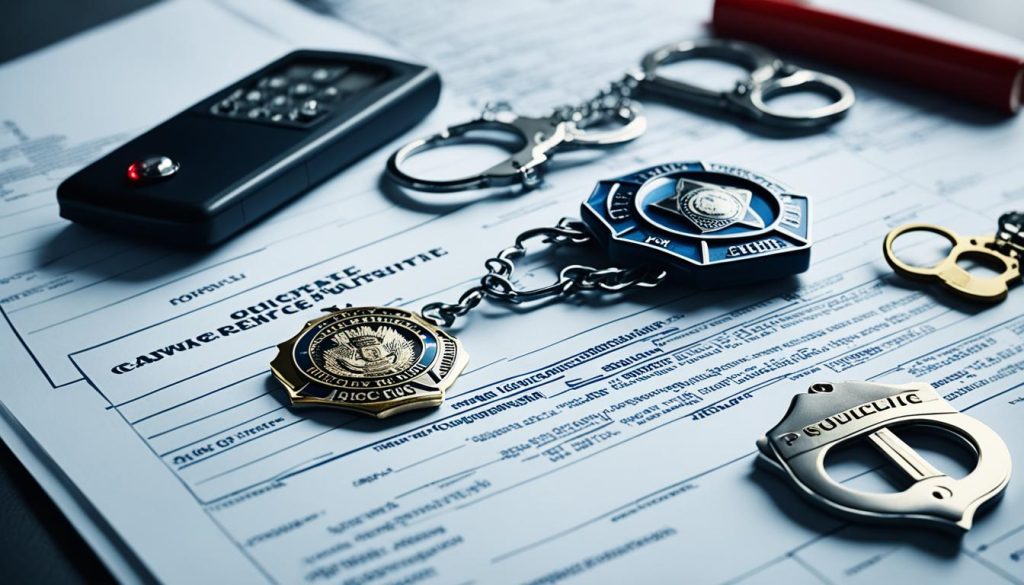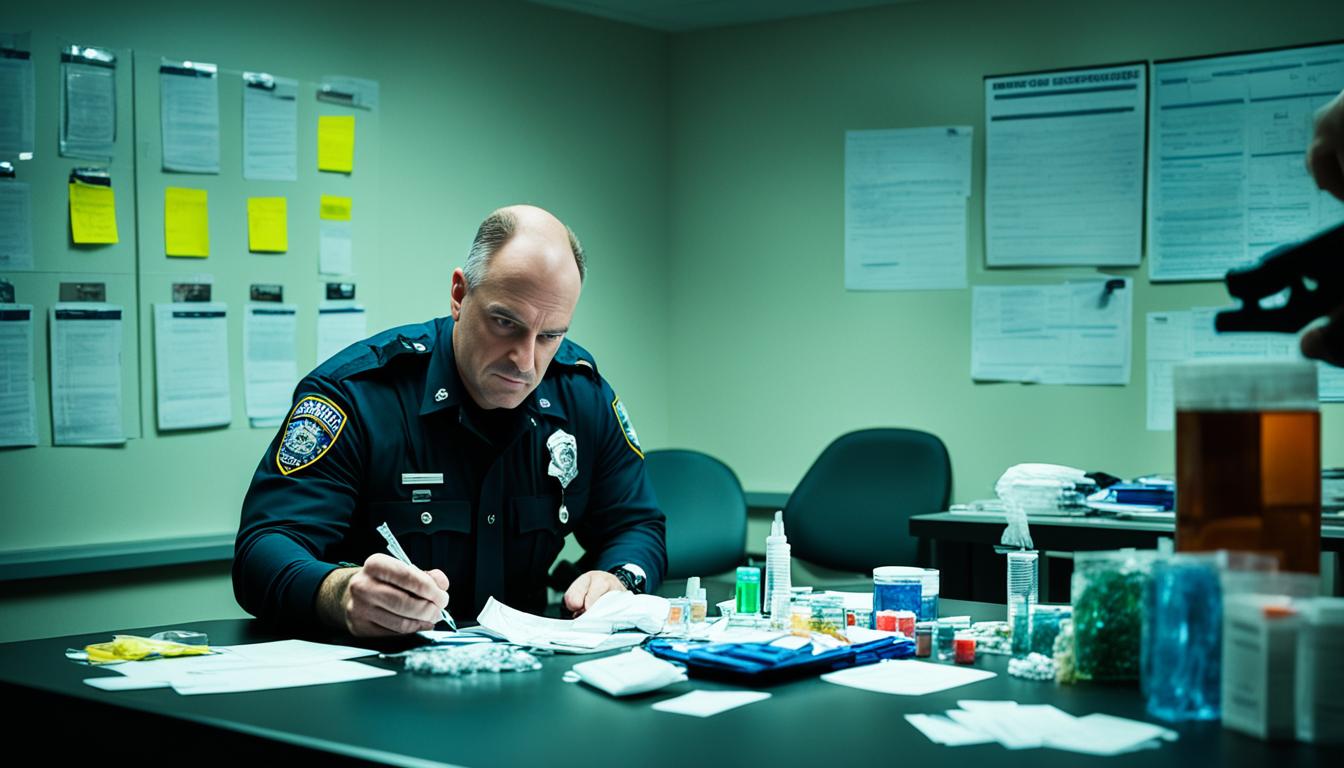Reporting Assault to Police: Process Explained
Did you know that in Canada, 1 in 3 women and 1 in 6 men will experience sexual assault in their lifetime? These alarming statistics highlight the urgent need for a comprehensive understanding of the reporting process and the police response to reported assaults.
When it comes to reporting an assault to the police, knowing what to expect can make all the difference in ensuring that justice is served and survivors’ rights are protected. In this article, I will guide you through the reporting process, from understanding the terminology to the investigation and legal proceedings.
Key Takeaways:
- 1 in 3 women and 1 in 6 men in Canada will experience sexual assault in their lifetime.
- A comprehensive understanding of the reporting process is crucial for survivors seeking justice.
- Knowing the key terminology used in assault cases is essential for effective communication with the police.
- After reporting an assault, immediate steps can be taken to ensure safety and access support.
- There are different reporting options available, including phone, hospital, and police station.
Understanding the Terminology
It is important to familiarize yourself with the key terminology used in assault cases. Understanding these terms can help you navigate the legal process with confidence and clarity.
Accused
The accused refers to the person who has been formally charged with committing the assault. This individual is presumed innocent until proven guilty in a court of law.
Alleged
The term alleged is used to describe an accusation or claim that has not yet been proven true or false. It is important to remember that an allegation does not equate to a conviction.
Complainant
The complainant is the person who has made the complaint to the police about the assault. As the complainant, your role is essential in bringing the case forward and seeking justice.
Consent
Consent is a crucial element in any sexual act. It refers to an informed, voluntary, and mutually understandable agreement between all parties involved. It is important to note that consent can be withdrawn at any time.
Criminal Court
In assault cases, the trial takes place in a criminal court. This court is responsible for hearing and deciding the case based on the evidence presented by the prosecution and the defense.
Crown Attorney
The Crown Attorney represents the government’s interest in the case. They are responsible for presenting the evidence against the accused and advocating for justice on behalf of the complainant and society.
Disclosure
Disclosure refers to the process of sharing evidence and information related to the case with the accused and their lawyer. It is crucial for ensuring a fair trial and allowing the defense to prepare their case adequately.
Now that you have a better understanding of the key terminology used in assault cases, you can navigate the legal process more confidently. Remember, each case is unique, and it is essential to seek legal advice specific to your situation.

Immediate Steps After Reporting
After reporting an assault to the police, it is crucial to take immediate steps to ensure your safety and well-being. Here are some options and resources available:
- Emergency Protection Order: If you have experienced family violence, you can request an emergency protection order. This order provides temporary protection and helps keep you safe during this challenging time.
- Sexual Assault Response Team (SART) Kit: The police may offer you the opportunity to undergo a SART kit examination. Specially trained nurses will conduct this examination to gather forensic evidence, which can be crucial for the investigation and legal process.
- Victim Services: Immediate support is essential after reporting an assault. Victim services are available to provide emotional support, crisis intervention, and connect you with other resources that can help you navigate through this difficult time.
Remember, you don’t have to go through this alone. There are people and organizations ready to support you and guide you every step of the way. Don’t hesitate to reach out for help.
Emergency Protection Order
An emergency protection order (EPO) is a legal measure that provides temporary protection to individuals who have experienced family violence. It is an important step to ensure your safety and well-being. Here’s some key information about EPOs:
| Key Points | Details |
|---|---|
| Definition | An EPO is a court-ordered document that restricts the actions of the person committing the violence and grants protection to the victim and their family. |
| Duration | The duration of an EPO varies and depends on the specifics of your situation. A judge will decide the length of the order based on the evidence presented. |
| Enforcement | An EPO is enforceable by law enforcement agencies. If the person subject to the order violates any of the restrictions, they may face legal consequences. |
| Process | To obtain an EPO, you will need to apply to a court. The court will review the evidence and make a decision based on the circumstances of your case. |

If you believe you need an emergency protection order, it is crucial to seek legal advice and consult with victim services or a lawyer who specializes in family law. They can guide you through the process and help you understand your rights and options.
Different Reporting Options
When reporting an assault to the police, there are different reporting options available. These options ensure that you can choose the most suitable method based on your circumstances.
If you prefer immediate assistance, you can phone the police by dialing the emergency number, 911. This will connect you with the appropriate authorities who can dispatch uniformed officers to your location. The officers will respond promptly and take the necessary steps to ensure your safety and well-being.
In some cases, the police may offer to take you to the hospital for medical attention and evidence documentation. This option allows you to receive immediate medical care from trained professionals who can also collect forensic evidence, which may be vital for the investigation.
If you feel more comfortable reporting in person, you can go directly to a police station to make a report. At the station, you will have the opportunity to speak with a police officer who will guide you through the process and take your statement. This option allows for a more personal interaction and may provide you with a greater sense of support.
Alternatively, you can choose to go to a hospital and request to see a Sexual Assault Response Team (SART) nurse. These specially trained nurses are equipped to provide medical care, collect evidence, and offer support to survivors of sexual assault.
Depending on the chosen reporting option, a recorded interview may be conducted at a later stage. This interview is designed to gather more details about the assault and will be conducted by trained professionals who will ensure your comfort and well-being throughout the process. The recorded interview plays a crucial role in building a comprehensive case against the accused.
| Reporting Option | Description |
|---|---|
| Phone Police | Dial the emergency number, 911, to have uniformed officers dispatched to your location. |
| Go to the Hospital | Receive medical attention and evidence documentation from trained professionals. |
| Go to a Police Station | Visit a police station to make a report in person and speak with an officer. |
| Go to a Hospital | Request to see a SART nurse for medical care, evidence collection, and support. |
Investigation and Legal Process
Once you have reported an assault, the investigation and legal process will be set in motion to seek justice. A sexual assault investigator will be assigned to your case, dedicated to conducting a thorough investigation. They will keep you informed about the progress, ensuring you have a clear understanding of the procedures involved.
If there is enough evidence gathered during the investigation, charges will be laid against the perpetrator. This is a significant step towards holding them accountable for their actions. The charges will then lead to the court process, where the case will be presented before a judge and potentially a jury.
It is important to note that there is no time limit for reporting a sexual assault in Canada. This means you can come forward and report the assault at any point, regardless of how much time has passed. However, it’s crucial to keep in mind that there may be limitations on when a civil lawsuit can be initiated. Consulting with a legal professional can provide you with the necessary guidance regarding the limitation period for civil actions.
Throughout this process, it is vital to have the support and guidance of professionals who specialize in assisting survivors of sexual assault. They can help you navigate the legal system, understand your rights, and provide emotional support during this challenging time.
| Key Steps in the Investigation and Legal Process | Description |
|---|---|
| Reporting the assault | Make a formal report to the police, providing details about the assault. |
| Assignment of a sexual assault investigator | A dedicated investigator will be assigned to your case to conduct a thorough investigation. |
| Evidence gathering | The investigator will gather evidence, which may include witness statements, physical evidence, and any available surveillance footage. |
| Laying of charges | If there is sufficient evidence, the investigator will work with the Crown Prosecutor to lay charges against the perpetrator. |
| Court process | The case will proceed to court, where it will be presented before a judge and, if applicable, a jury. |
| Support and assistance | Throughout the process, you can seek support from victim services and other professionals who specialize in assisting survivors of sexual assault. |
Support and Rights
Throughout the reporting and legal process, you are entitled to support and have certain rights. Victim support services are available to provide ongoing assistance and support for survivors of assault. These services are designed to help you cope with the emotional and psychological impact of your experience, as well as navigate the legal system.
It is important to be aware of the potential legal implications of reporting an assault. When you decide to report an assault, you are taking a brave step towards seeking justice. The legal process can be complex, but it is essential to understand your rights as a survivor. This includes your right to be informed about the progress of the case, to have your voice heard in court, and to access compensation if applicable.
The LGBTQ2S community can rest assured that the Toronto Police Service has undergone specialized training to effectively support and serve their community. Your sexual orientation or gender identity should never hinder you from seeking help and justice. The police are committed to treating all individuals, regardless of their sexual orientation or gender identity, with sensitivity, inclusivity, and respect.
- Quebec Police Officer Salary Insights 2023 - July 13, 2025
- Canada Arrest Protocol: What Police Say Upon Arrest - June 12, 2025
- Can Police Disclose Who Reported You? Find Out Here - June 6, 2025



















Post Comment